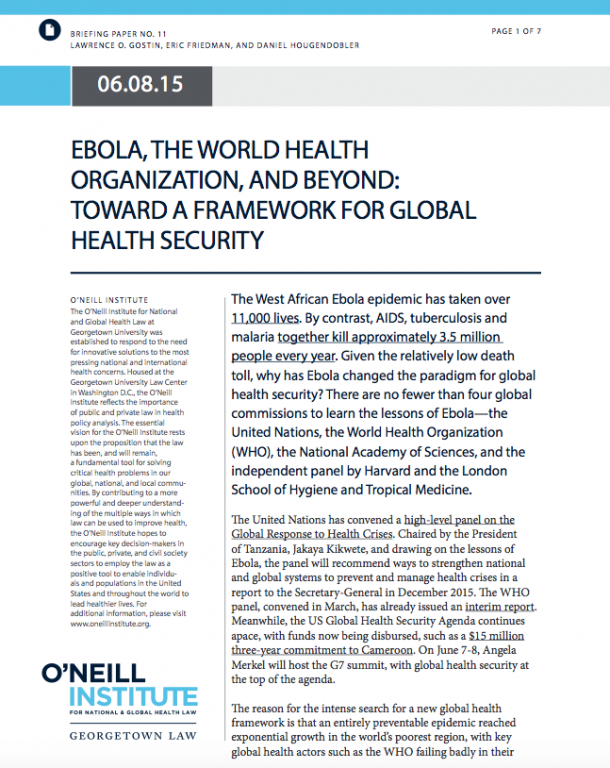 The West African Ebola epidemic has demonstrated that the world remains ill-prepared to respond to infectious disease outbreaks. A host of institutions are now reviewing what went wrong, and new institutions are being considered, including an African Centers for Disease Control and Prevention and World Bank-initiated Pandemic Emergency Facility. The World Health Organization itself failed in one of its core functions by allowing a preventable infectious disease to spiral out of control in the world’s poorest region. The 68th World Health Assembly (WHA), held in May 2015, provided an opportunity for the Organization to reflect on what went wrong and reform the organization to be better able to address the next epidemic. In this Briefing Paper we lay out the present landscape, including reforms needed of the International Health Regulations, and assess the strengths and weaknesses of the outcomes of the 68th WHA, including integrating WHO’s outbreak and emergency response programs; creating a global health emergency workforce, deployable on short notice; and setting up a global health emergency contingency fund. We also consider the vital structural issues the WHA failed to effectively address, including bolstering WHO’s core funding, increasing coherence between the WHO headquarters and regional offices, and enhancing civil society engagement.
The West African Ebola epidemic has demonstrated that the world remains ill-prepared to respond to infectious disease outbreaks. A host of institutions are now reviewing what went wrong, and new institutions are being considered, including an African Centers for Disease Control and Prevention and World Bank-initiated Pandemic Emergency Facility. The World Health Organization itself failed in one of its core functions by allowing a preventable infectious disease to spiral out of control in the world’s poorest region. The 68th World Health Assembly (WHA), held in May 2015, provided an opportunity for the Organization to reflect on what went wrong and reform the organization to be better able to address the next epidemic. In this Briefing Paper we lay out the present landscape, including reforms needed of the International Health Regulations, and assess the strengths and weaknesses of the outcomes of the 68th WHA, including integrating WHO’s outbreak and emergency response programs; creating a global health emergency workforce, deployable on short notice; and setting up a global health emergency contingency fund. We also consider the vital structural issues the WHA failed to effectively address, including bolstering WHO’s core funding, increasing coherence between the WHO headquarters and regional offices, and enhancing civil society engagement.
The complete briefing, written by O’Neill Institute Associate – Eric Friedman, Fellow – Daniel Hougendobler, and Faculty Director – Lawrence Gostin, can be found here.
Latest
Mantener la prohibición de la exhibición indirecta de productos de tabaco salva vidas
Ariadna Tovar Ramírez Fernanda Rodríguez-Pliego



